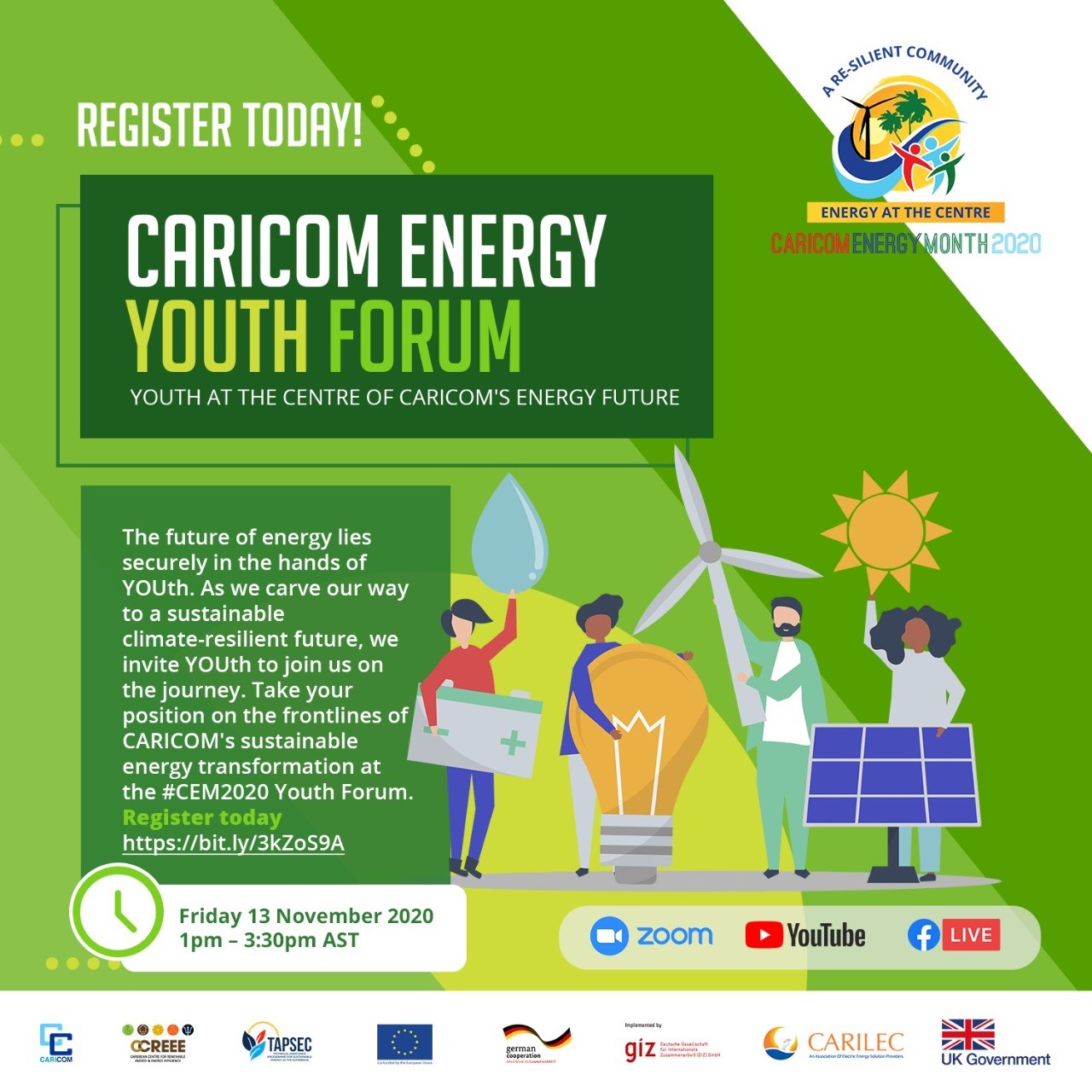
Under the theme, “YOUth at the Centre of CARICOM’s Energy Future”, young people from across CARICOM member states joined energy experts, thought leaders and policymakers at the CARICOM Energy Month (#CEM2020) Virtual Youth Forum on Friday 13 November 2020.
The event is a collaboration between the CARICOM Secretariat, the UK Government, the Caribbean Centre for Renewable Energy and Energy Efficiency (CCREEE) and the Technical Assistance Programme for Sustainable Energy in the Caribbean (TAPSEC).
Aimed at young people ages 15-35, the organisers engaged a broad coalition of young people as institutions work to ensure youth inclusion and devise strategies to mainstream the voice, vision, innovations and initiatives of young people in CARICOM’s transition toward a sustainable, climate-resilient future.
The three-part Forum featured presentations by regional and international development organisations working toward advancing sustainable energy initiatives within the region. Attendees gained insights into sustainable energy projects and initiatives currently underway, emerging technologies, energy innovations, capacity development opportunities and employment pathways for young professionals within the region’s sustainable energy sector.
Among those speaking at the Forum was Ambassador Fiona Clouder, COP26 Regional Ambassador to Latin America and the Caribbean. Ambassador Clouder shared key insights on the upcoming 26th UN Climate Change Conference of the Parties (COP26) and the £1,000,000 Earth Shot Prize recently launched by Prince William and Sir Attenborough.
The Forum also featured presentations by regional youth-led organisations, including the CARICOM Youth Ambassador corps; the Caribbean Youth Environment Network; the Commonwealth Youth Council; and the British Chevening Scholars – Caribbean Network, who will share on the work their respective organisations are leading, the gaps and challenges experienced and the role regional partners can play in mainstreaming youth inclusion and participation in the sustainable energy sector.
The Forum concluded with a candid consultation addressing the existing gaps, challenges and solutions required to mainstream youth development and advance the sustainable energy sector.
Dr Devon Gardner, Programme Manager for Energy at the CARICOM Secretariat, noted that the event was not “just a talk shop”, but an event from which ideas will emerge and be integrated into the work and approach of the sector. He went on to note that “Our region’s energy leaders are excited to attend the monumental Forum. We listened to the views expressed, asked the relevant questions, had a forward-looking, constructive dialogue and established thematic priority areas for action. We anticipate a plethora of suggestions to treat with the sector’s current shortcomings and we stand ready to listen, engage and integrate the solutions put forward to inform the ongoing energy transition efforts throughout the region.”
The Forum is also intended to stimulate long-term interaction among interested and emerging young energy leaders to strengthen the regional network of youth and young professionals involved in the energy space and identify opportunities for collaboration and future discourse with regional energy stakeholders.
Reflecting on the Caribbean Centre for Renewable Energy and Energy Efficiency’s (CCREEE) youth focus, the Centre’s Executive Director – Dr Gary Jackson – remarked on the necessity of youth involvement. “For us at the CCREEE, youth engagement is critical. We need to provide them with an enabling environment to support their development and by extension the development of a resilient energy future. This is why we strongly believe that youth should have a voice in matters that affect their future and, they must have a seat at decision making tables. This event therefore is not tokenism; the CCREEE truly sees youth as innovators and pioneers and are happy to partner to provide this platform.”
Programme Lead for the Technical Assistance Programme for Sustainable Energy in the Caribbean (TAPSEC), Mr Simon Zellner added that “The TAPSEC recognises the contributions made to date by young people and professionals in the region’s transition to a sustainable, climate-resilient future. It is for this reason that in collaboration with regional partners, and with the support of the European Union (EU) and the German Federal Ministry of Economic Development and Cooperation (BMZ), we continue to invest in in the young people of CARICOM through greening education initiatives with CXC, capacity development initiatives such as the Regional Energy Apprenticeship Programme, institutional strengthening interventions such as the establishment of the Northern Caribbean’s first Micro Grid Training Facility, at the UWI Mona Campus and network and partnership formulation activities, such as the Youth Forum”.
CARICOM Energy Month (CEM) is being observed under the theme `A RE-silient Community: Energy at the Centre’. Activities during the month are being held in partnership with institutions and Member States of CARICOM, as well as the development agencies and partners that actively support and promote sustainable energy development within the Community. CEM was launched on 2 November with a Virtual Panel Discussion where experts discussed the path to a sustainable, climate-resilient future for the region. Other activities during the month include webinars and live demonstrations, and an energy personality series.